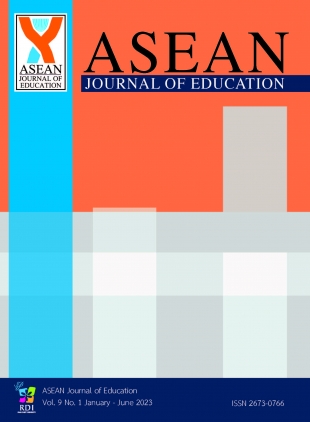Development of Learning Process Model: The Morals and Ethics of Early Childhood in 21st Century
Keywords:
Learning process model, Physical literacy, Morals and ethics, Early childhoodAbstract
One of essential morals and ethics for early childhood in the 21st century is self-discipline. The research objective consisted of 1) to develop the model of learning process of the morals and ethics of the early childhood in the 21st century, 2) to study effectiveness of the implementation of model of learning process of the morals and ethics of the early childhood in the 21st century, 3) evaluate and acceptance of the model of learning process of the morals and ethics of the early childhood in the 21st century.
This research and development was organized into 4 phrases. A sample of 80 pupils in kindergarten 3 under the Nakhonnayok Primary Educational Service Area Office was recruited. Cluster random sampling was employed in this research. The experimental group had 40 pupils who used the model of learning process of the morals and ethics of the early childhood in the 21st century, and the control group of 40 pupils who learned by using the traditional learning process model. Research instruments consisted of 1) lesson plans of the learning of morals and ethics of the early childhood in the 21st century, 2) evaluation form of the morals and ethics behavior of the early childhood in the 21st century, 3) evaluation form of the physical literacy of the early childhood, and 4) evaluation and acceptance form for the model of learning process of the morals and ethics of the early childhood in the 21st century. The research design used in this study was the pre-test/post-test control group design. The obtained data was analyzed using mean (x̅ ) standard deviation (SD), t-test dependent and content analysis.
The results found the following: 1) The model of learning process of the morals and ethics of the early childhood in the 21st century consisted of 7 dimensions, and the efficiency was 81.12 / 82.23,2) Students in the experimental group achieved higher scores than the control group at statistical significance at the .01 level, and 3) The model of learning process of the morals and ethics of the early childhood in the 21st century was suitable at the highest level.
References
Attaporn, J. (2014). Development of an active online instructional model to enhance learning behaviors of undergraduate students. Electronic journal in Education, 9(4), 122-136.
Bairaksa, C., & Srichailard, P. (2020). The development of computer assisted instruction lessons by using think pair share techniques a case study of using Microsoft PowerPoint for Mathayomsuksa 1 students at Tessaban 2 Wat Saneha School (Samak Phol Padung). In V. Pinkaew (Ed.), The 10th NPRU National Academic Conference, Nakhon Pathom Rajabhat University: Fostering the King's Philosophy in Research and Sustainability Regional Development. Nakhon Pathom Rajabhat University.
Brahmawong, C. (2013). Developmental testing of media and instructional package. Silpakorn Educational Research Journal, 5(1), 7–20.
Da Silva S. G., Arida R. M. (2015). Physical activity and brain development. Expert Review of Neurotherapeutics. 15, 1041–1051.
Gardner, H. (2017). Physical literacy on the move: Games for developing confidence and competence in physical activity. Human Kinetics.
Jansook, C., Promjouy, S., Pibool. S., & Suwannaka, Y. (2017). The Development of an Evaluation Model for Assessment of the Caring Competencies of Nursing Students in Nursing Colleges under Praboromarajchanok Institute. Journal of Nursing and Education, 10(2), 71-88.
Komintarachat, R. (2011). A Study of Teacher Training Programme According to the Curriculum Created under the Higher Reform: Desirable features in Thailand. The 5th Rampaipannee academic conference for sustainable development and sufficiency economy dated 19-20 December 2011. Pages 127-131. Chantaburi.
Tantipalachiva, K. (2007). Early Childhood Education Intelligence. Bangkok: Srinakharinwirot University Printing Center.
Marheni, E., Purnomo, E., Jermaina, N., Afrizal, S., Sitompul, S. R., Suardika, I. K., & Ardita, F. T. (2021). Discipline Levels of Junior Students during Physica lEducation Lessons at Schools. International Journal of Human Movement and Sports Sciences, 9(4), 635-641.
Ministry of Education. (2017). Early Childhood Education Curriculum B.E. 2560. Bangkok: Karusapa printing, Lat Phrao Council.
Montessori, M. (2007). Early Childhood Programs: Applying Theories to Practice. Early Childhood Education Today. Upper Saddle River, NJ: Prentice Hall, Inc.
Piaget, T. (1965). The Origins of Intelligence in children. New York: W.W. Norton.
Ruddell, R. B., & Ruddell, M. R. (1995). Teaching children to read and write! Becoming an influential teacher. Boston: Allyn and Bacon.
Satchel, B. (1992). Increasing Prosocial Behavior of Elementary Students in Grades K-6 through a Conflict Resolution Management Program. Retrieved from http://eric.ed.gov/?id=ED 347607
Settle, B. (2011). From theories to Queries: Active learning in Practice. Workshop and conference Proceedings, 16, 1-18.
Stufflebeam, D. L. (1981). Evaluation Models. San Francisco: Jossey-Bass.
Vidourek, R. A., King, K. A., Bernard, A. L., Murnan, J., & Nabors, L. (2011). Teachers’ strategies to positively connect students to school. American Journal of Health Education, 42(2), 116-126.
Vygotsky, L. (1978). Problems of Method in Mind in Society. Cambridge, MA: Harvard University Press.
Whitehead, M. (2010). Physical literacy: Throughout the life course. London, England: Routledge.
World Health Organization. (2010). Global Recommendations on Physical Activity for Health. Switzerland: WHO Press.
Wongrugsa, A., Kanjanawasee, S., & Ratchusanti, S. (2021). The propriety and possibility of an evaluation model for undergraduate vocational programs: an application of multiple evaluation approaches. Panyapiwat Journal, 13(1), 189-200.
Downloads
Published
How to Cite
Issue
Section
License

This work is licensed under a Creative Commons Attribution-NonCommercial-NoDerivatives 4.0 International License.
1 All articles will undergo a formal peer-review. A panel of experts from within or without the university will examine the article; approval from a minimum of two experts is required for publication. Revisions posed by the experts must be completed by the research prior to publication.
2 Once published in the ASEAN Journal of Education, the article becomes intellectual property of Suan Dusit University. Duplication, in full or part, requires permission from Suan Dusit University.
3 Excluding errors incurred during printing, author(s) are responsible for the content of their articles.






